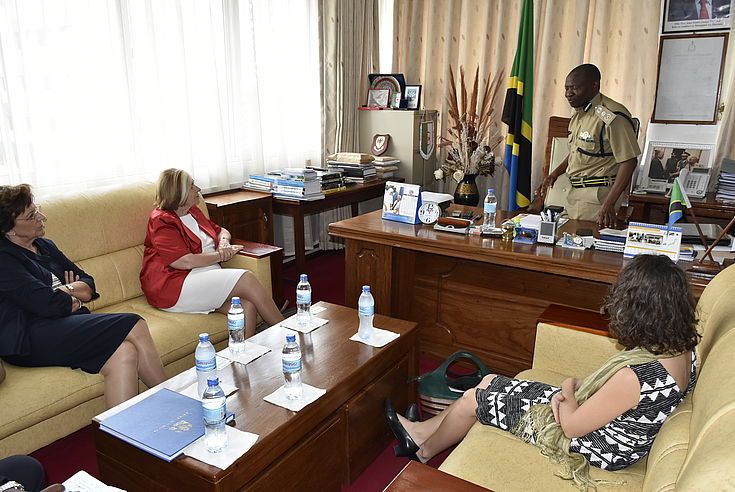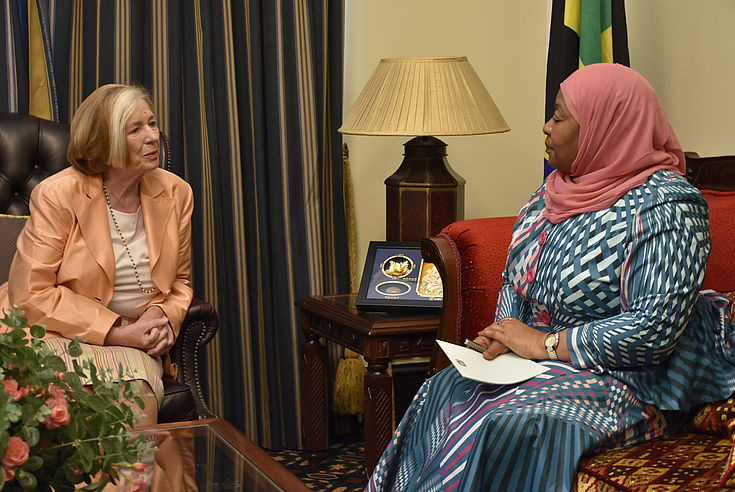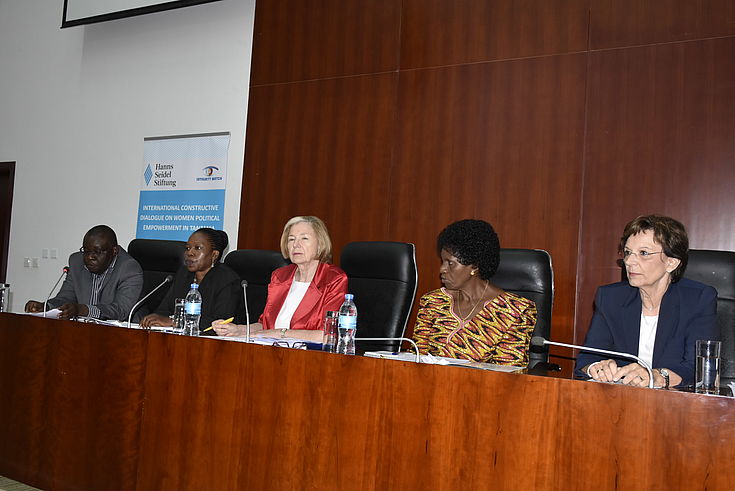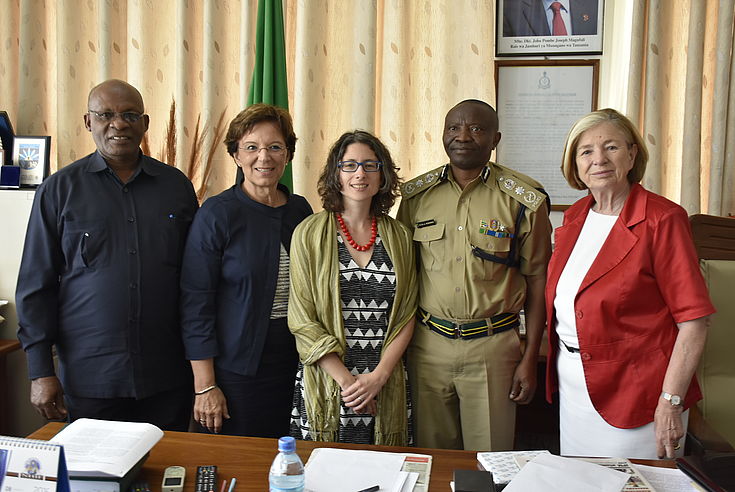High level delegation visit from Bavaria in Tanzania to learn about women political empowerment
The Chairlady of the Hanns Seidel Foundation (HSF) Germany, Prof. Ursula Männle pay a courtesy call to H.E. Samia Suluhu, the Vice President of the United Republic of Tanzania
Women in the Tanzanian parliament constitute about 36%. This is similar to the German figure where about 37, 1% of parliamentarians are women. However in Tanzania 30% of this number are reached by a quota system of so called “special seats”. The gender ratio between men and women councilors is estimated to be 204/3742, while representation on the local level is even more less. Likewise participation of women in leading position in political parties in Tanzania currently is about 11%.
In order to improve this trend HSF Tanzania has been running a Women Political Leadership Program for over 10 years now. Within this program HSF partners with the NGO Centre for Good Governance and Economic Development to coach a selected number of women on topics such as Leadership Skills, Ethics in Politics, Campaigning and Networking Skills as well as on Gender in Politics. The successes of this program – former participants include several Deputy Ministers, Ministers and MPs – initially raised the interest of Prof. Männle and Minister Müller and let to their desire to visit Tanzania.
The Chairlady of the Hanns Seidel Foundation (HSF) Germany, Prof. Ursula Männle chairing the international panel discussion on women political empowerment with the theme “What has been achieved or missed in the last two decades of multiparty democracy and what needs to be done differently?’ together with Retired Speaker Hon. Anna Makinda, Minister of the Free State of Bavaria, Mrs. Emilia Müller
The highlight of their visit was a courtesy call to H.E. Samia Suluhu, the Vice President of the United Republic of Tanzania on Thursday August 11 during which the delegation discussed social political development matters as well as women development especially in regards to young girls. Prof. Männle reaffirmed HSF’s full willingness to continue accompanying the country’s process to ensure more space to women in decision making bodies. During the talk, the HSF Chairwoman congratulated Hon. Suluhu for being appointed as the first female vice president of Tanzania and she acknowledged the achievements made by the government of Tanzania in supporting the civic participation of women in political processes.
During the welcome reception Prof. Männle and Minister Müller also had the chance to discuss with Hon. Ummy Mwalimu, MP, the role of the ministry of Gender, Community Development, Gender, Elderly and Children in strengthening women’s capacity at all levels.
Further points on the agenda were an exchange with former beneficiaries of the Women Political Leadership Training Program, including prominent beneficiaries like Hon. Angelina Mabula the Deputy Minister for Lands, Housing and Human Settlement, and a meeting with the Minister for Labor, Empowerment, Elderly, Youth, Women and Children of the Revolutionary Government of Zanzibar, Hon. Mauldine Castico during the delegation discussed the challenges of women empowerment in Zanzibar.
The Chairlady of the Hanns Seidel Foundation (HSF) Germany, Prof. Ursula Männle had a brief discussion with Tanzania Police Force on the ongoing Partnership with the Foundation, on Community Policing and Gender Based Violence
Prof. Männle and Hon. Minister Müller also had the opportunity to participate in an international panel discussion on women political empowerment with the theme “What has been achieved or missed in the last two decades of multiparty democracy and what needs to be done differently?’ organized by Hanns Seidel Foundation Tanzania in collaboration with its partner Integrity Watch.
On that occasion, she spoke in a panel about “Political Parties as a bridge for Women participation and leadership: What the Christian Social Party of Bavaria has done and is doing to boost female participation? A Case Study of Germany “. Other panelists included Hon. Emilia Müller; Dr. Alexander Makulilo, Dean of the faculty of Political Science and Administration Department at the University of Dar es Salaam; Prof. Ruth Meena, Chairwoman-Women Fund Tanzania; Ms. Mary Rusimbi-Director women Fund Tanzania and Ms. Anna Mghwira, the National Chairperson of ACT Wazalendo Party (and the only woman presidential aspirant in the last year’s general election). All sessions were moderated by Prof. Bernadeta Kilian- Principal of Mkwawa University College of Education.

The journey ended with a visit to Bagamoyo where the delegation had the chance to hear from female representatives of the local government and administrative what challenges they are facing as women when participating in politics on the local level.
Both delegates from Germany thanked the HSF Tanzania for organizing such an informative stay for them in Tanzania and concluded by stressing once again the necessity of supporting women in entering into politics. By quoting a participant of one of the HSF programs in South Africa Mrs. Männle remarked in her opening speech during the reception on the 9th of August: “Women often do not seek a title or power but rather seek to serve. However this characteristic approach to leadership is both strength and a weakness: Call a certain task a “service” or a “problem” and women will step up for it. Give it a name and position and women will look around to find a man.” […] But it is important that women participate to a greater extend in decision making processes because they are likely to contribute a different point of view to issue-based debates than their male counterparts. “



